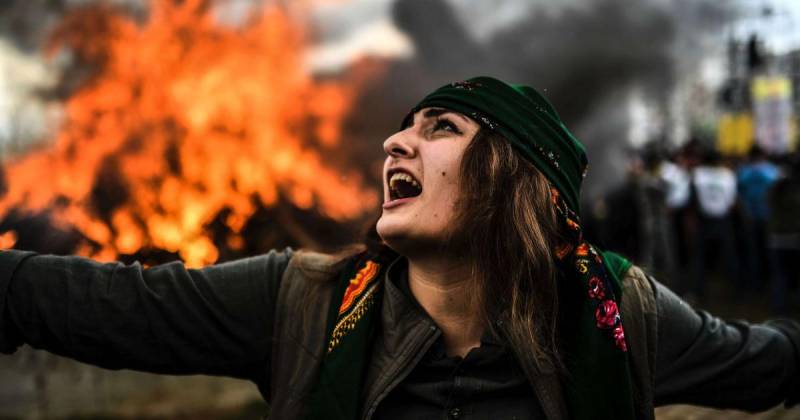Visiting my hometown of Diyarbakır last week, the ruling Justice and Development Party (AKP) candidate for Istanbul mayor, Binali Yıldırım, said that when Turkey’s parliament was first established, “a Kurdistan deputy” was among those invited to participate by the country’s founder, Mustafa Kemal Atatürk. Yet for years, many people, including myself, have been subject to investigation for using the term Kurdistan.
Encompassing southeastern Turkey as well as parts of Iraq, Syria, and Iran, Kurdistan is a place that alternatively exists and does not exist in Turkey, depending on the political priorities of the Turkish government.
When President Recep Tayyip Erdoğan pursued a peace process with the Kurdish movement officially beginning in 2013, the term Kurdistan was used freely in parliament. When the peace process collapsed in the summer of 2015, the term was banned. The word Kurdistan was no longer recorded in parliamentary proceedings, and those who used it were met with disciplinary action.
Bear in mind, when Osman Baydemir, a deputy for the pro-Kurdish Peoples’ Democratic Party (HDP), spoke in front of parliament saying, “as a representative from Kurdistan, I want this roof to be a joint roof for Turks and Kurds,” he was fined 12,000 lira and temporarily barred from the chamber.
Erdoğan is among the Turkish politicians who use the term the most, depending on the climate. After accepting “the existence of Kurdistan” during the peace process, once the process ended, Erdoğan did not hesitate to tell Kurdish people who criticised him to “go back to Kurdistan”. Most recently, in a speech he made on March 17, Erdoğan directed comments at HDP co-leader Sezai Temelli, saying: “There is no Kurdistan here. If you want it so badly, there is one in northern Iraq. Take a hike and go there”.
As Yıldırım was handing out roses to Kurdish people in Diyarbakır a few days ago, AKP-led municipal governments in Bitlis and Tatvan were taking down Kurdish signs. First, the Turkish-Kurdish sign in front of the Bitlis municipal building was taken down, and replaced with a Turkish one.
Later, the same was done in Tatvan. Not content to stop there, the next day the Tatvan municipal government took down Kurdish signs in local cemeteries. Most Kurdish street and park names had already been changed to Turkish names by government-appointed administrators who have run many Kurdish cities since 2016.
Dozens of organisations and institutions that work on Kurdish language and culture have been shut down, Kurdish symbols have been erased from Kurdish cities, and Kurdish statues have been taken down. It seems that recently elected AKP municipal governments will be no better than the administrators who were in control for the past few years.
The situation in parliament is no different. Soon after the peace process ended, when newly elected Leyla Zana spoke in Kurdish during her swearing in ceremony in parliament in November 2015, her speech was redacted in the official record. Since then, no Kurdish has appeared in parliamentary records. The native language of at least 15 million citizens is now a language that is crossed out by the parliament that claims to represent those citizens.
In a speech last month, Erdoğan made the following statement:
“Before we came to power, you could not see a single Kurdish sign in the southeast. After we came to power Kurdish signs came up. Before fathers could not speak Kurdish in prisons, now they are able to speak Kurdish.”
You are wrong, Mr. President! All of the democratic initiatives the AKP initially enacted have been reversed in full. The administrators you appointed in the region declared war on Kurdish language and culture, and today’s AKP municipalities are no different. The state is wreaking havoc on Kurdish people.
We have gone from the writer Musa Anter, who was beaten up for whistling a Kurdish song in 1940, to students at Diyarbakır’s Dicle University getting arrested for singing in Kurdish today. We have gone from renowned folksinger Ahmet Kaya, who passed away in exile after expressing his intention to sing in Kurdish, to wedding singers who are arrested for singing in Kurdish. We have reached a point where people are investigated and arrested for using the term Kurdistan.
After all these years, all of the deaths and denial, what is the result? Have Kurdish people forgotten their identity? Has the Kurdish language disappeared? Has Kurdistan ceased to exist? Has denying the existence of Kurdish people, the Kurdish language, and Kurdistan brought Turkey and its peoples happiness and peace?
If we look back on the past 100 years, we can see this clearly; although the state’s policy against Kurdish representation has peaks and troughs, Kurdish people have displayed perseverance and durability. Democratic initiatives, massacres, crackdowns – they make no difference. For 100 years, Kurdish people have continued resisting, recognising their identity and refusing to give up their language and their culture.
The demands have been the same for 100 years. What the state sometimes acknowledges and sometimes denies is a matter of existence for Kurdish people.
Of course we Kurds will neither get lost as Erdoğan says, nor will we forgive the AKP after all of this cruelty simply because Yıldırım says Kurdistan. We will continue struggling until our existence, our identity, and our culture are accepted.
Before I finish, let me take a precaution to ensure another case is not brought against me:
In 1971, in the city of Siirt, Kurdish intellectual Feqi Hüseyin Sağnıç went on trial for promoting Kurdishness. One courtroom exchange went as follows:
Prosecutor: Why are you promoting Kurdishness?
Feqi: Can I ask a question first?
Prosecutor: You may.
Feqi: Do you believe Kurds exist?
Prosecutor: Of course not, there is no such thing as a Kurd!
Feqi turned around and began walking toward the door.
Prosecutor: Where are you going?
Feqi: Sir, if there are no Kurds, how can one promote Kurdishness? Either say that Kurds exist, or if you say they do not, then do not accuse me of promoting Kurdishness!
© Ahval English
